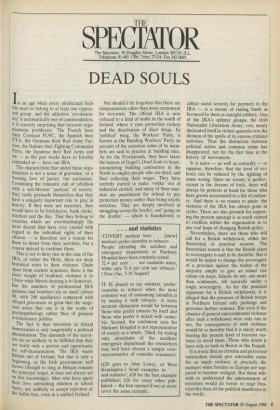DEAD SOULS
In an age when every intellectual feels the need to belong to at least one oppres- sed group, and the adjective 'revolution- ary' is automatically one of commendation, it is scarcely surprising that terrorist orga- nisations proliferate. The French have their Corsican FLNC, the Spanish their ETA, the Germans their Red Army Fac- tion, the Italians their Fighting Communist Party, the Japanese their Red Army and We — as the past weeks have so forcibly reminded us — have our IRA.
The characteristic that unites these orga- nisations is not a sense of grievance, or a burning love of justice, but narcissism. Combining the romantic cult of rebellion with a sub-Marxist 'analysis' of society, they easily persuade themselves that they have a uniquely important role to play in history. If they were not terrorists, they would have to be bricklayers, bank clerks, teachers and the like. That they belong to societies which are overwhelmingly the most decent that have ever existed with regard to the individual rights of their citizens — is therefore not a reason for them to desist from their activities, but a reason instead to continue them.
This is not to deny that in the case of the IRA, or rather the IRAs, there are deep historical roots to their violence. Quite apart from ancient injustices, there is the sheer weight of tradition; violence is to Ulster what Morris dancing is to Somerset. But the numbers of professional IRA gunmen and bombers are so small (about 60, with 200 auxiliaries) compared with alleged grievances so great that the suspi- cion arises that one is in the realm of psychopathology rather than of genuine revolutionary politics. The fact is that terrorism in liberal democracies is only tangentially a political phenomenon. The demands of the terror- ists are so unlikely to be fulfilled that they are really only a pretext and opportunity for self-dramatisation. The IRA wants Britain out of Ireland, but that is only a beginning, as the Irish government well knows (though so long as Britain remains the principal target, it does not always act on this knowledge). Men who have spent their lives ambushing children in school buses, are unlikely to accept rejection at the ballot box, even in a unified Ireland. Nor should it be forgotten that there are Compensations other than mere excitement for terrorists. The official IRA is now reduced to a kind of mafia in the south of Ireland, where it runs protection rackets and the distribution of illicit drugs. Its `political' wing, the Workers' Party, is known as the Building Workers' Party on account of the extortion some of its mem- bers are said to practise at building sites. As for the Provisionals, they have taken the lessons of Gogol's Dead Souls to heart, intimidating building contractors in the North to employ people who are dead, and then collecting their wages. They have recently started to make 'vodka' out of industrial alcohol, and many of their mur- ders are punishment for refusal to pay protection money rather than being strictly sectarian. They are deeply involved in smuggling across the border; and 'going on the double' — which is fraudulently to collect social security for payment to the IRA — is a means of raising funds as favoured by them as outright robbery. One of the IRA's splinter groups, the Irish Nationalist Liberation Army, very nearly decimated itself in violent quarrels over the division of the spoils of its various criminal activities. Thus the distinction between political action and common crime has disappeared, not for the first time in the history of movements.
It is naive — as well as cowardly — to suppose, therefore, that the level of vio- lence can be reduced by the righting of some wrong. Since no society is perfect, except in the dreams of fools, there will always be pretexts at hand for those who have grown accustomed to a life of outlaw- ry. And there is no reason to panic: the violence of the IRA has always gone in cycles. There .are also grounds for suppos- ing the present upsurge is as much related to conflicts within the organisation as to any real hope of changing British policy. Nevertheless, there are those who will call for a British withdrawal, either for theoretical or practical reasons. The theoretical reason is that the British claim to sovereignty is said to be doubtful. But it would be unjust to change the sovereignty of a province against the wishes of the majority simply to give an island one colour on maps. Islands do not, any more than continents, fall naturally under a single sovereignty. As for the practical argument for a British withdrawal, it is alleged that the presence of British troops in Northern Ireland only prolongs and provokes further violence. But even if the chances of general intercommunal violence after such a withdrawal were only one in ten, the consequences of such violence would be so horrible that it is surely worth bearing the present level of terrorist vio- lence to avoid them. Those who doubt it have only to look to Beirut or the Punjab.
It is ironic that an extreme and perverted nationalism should give ostensible cause for so much violence at precisely the moment when borders in Europe are sup- posed to become vestigial. But those who wish to understand the phenomenon of terrorism would do better to read Dos- toyevsky than all the political manifestos in the world.






















































 Previous page
Previous page